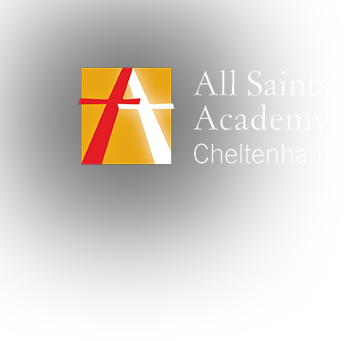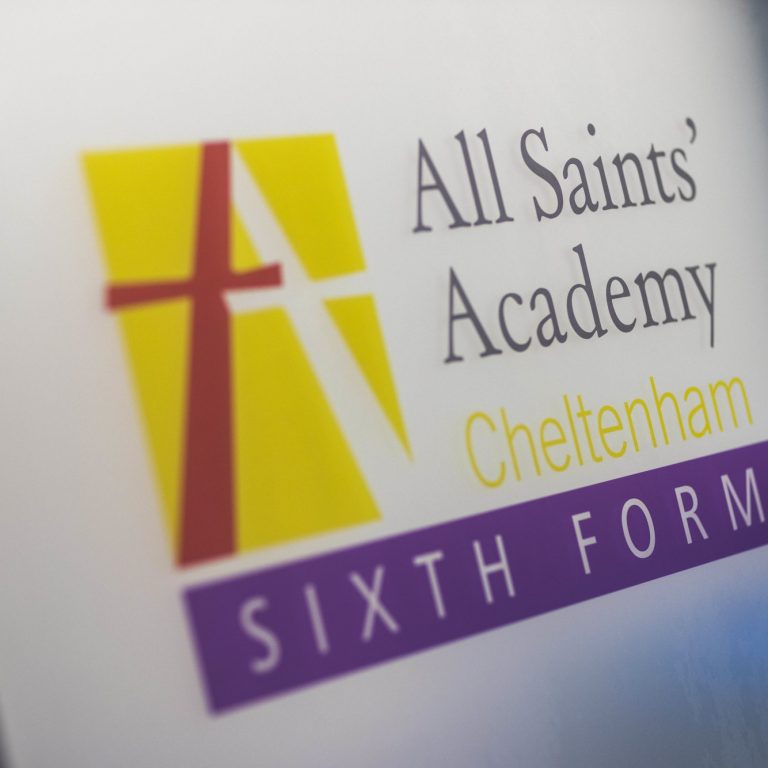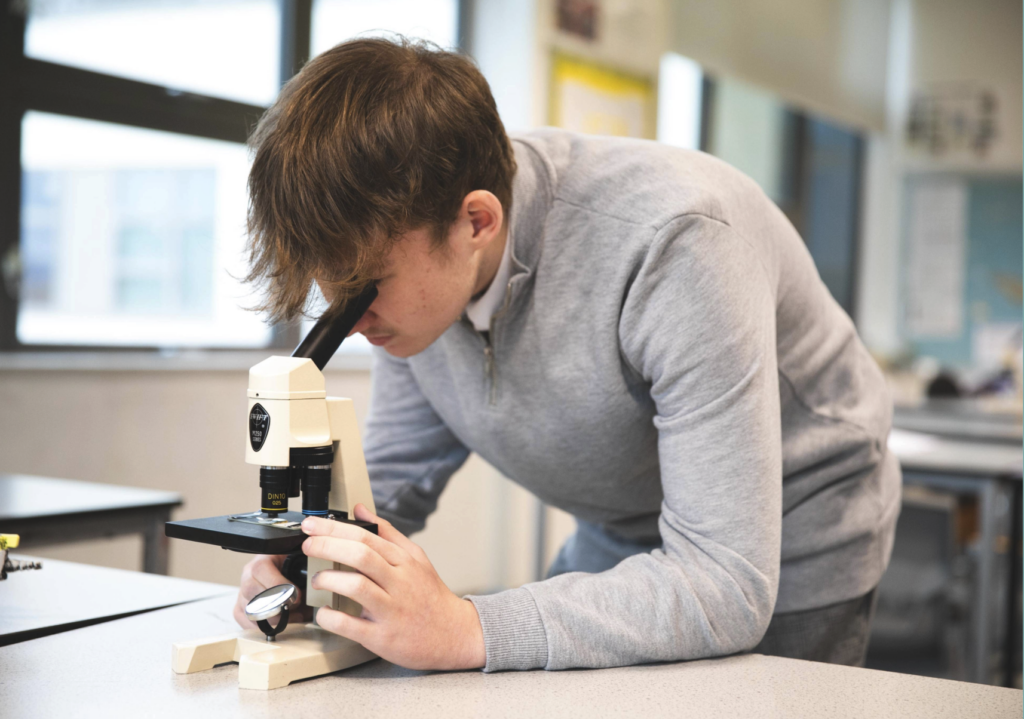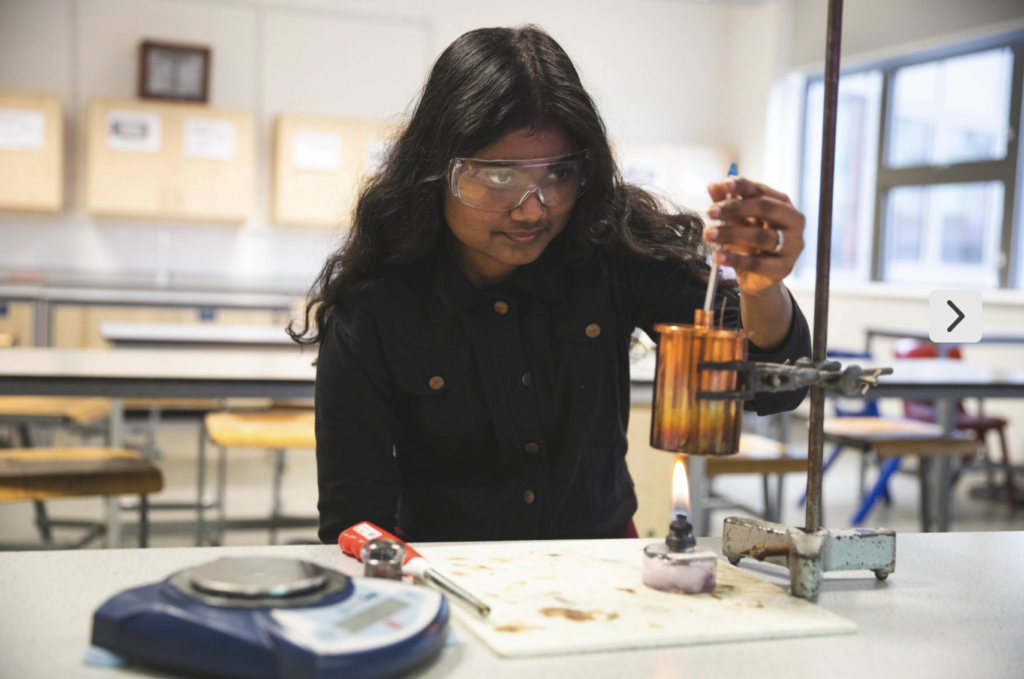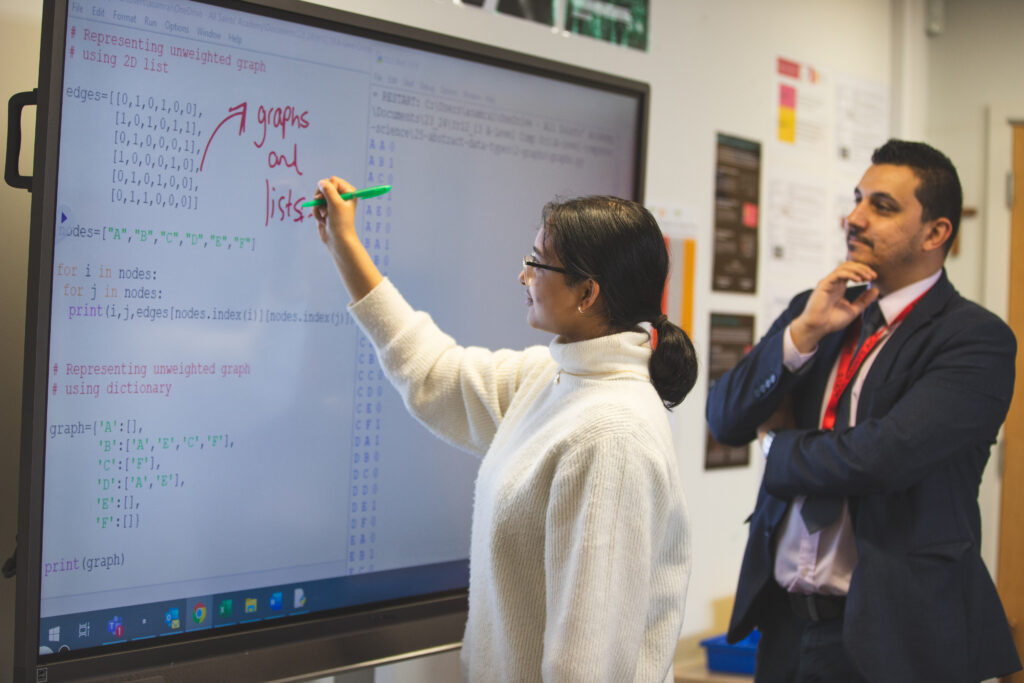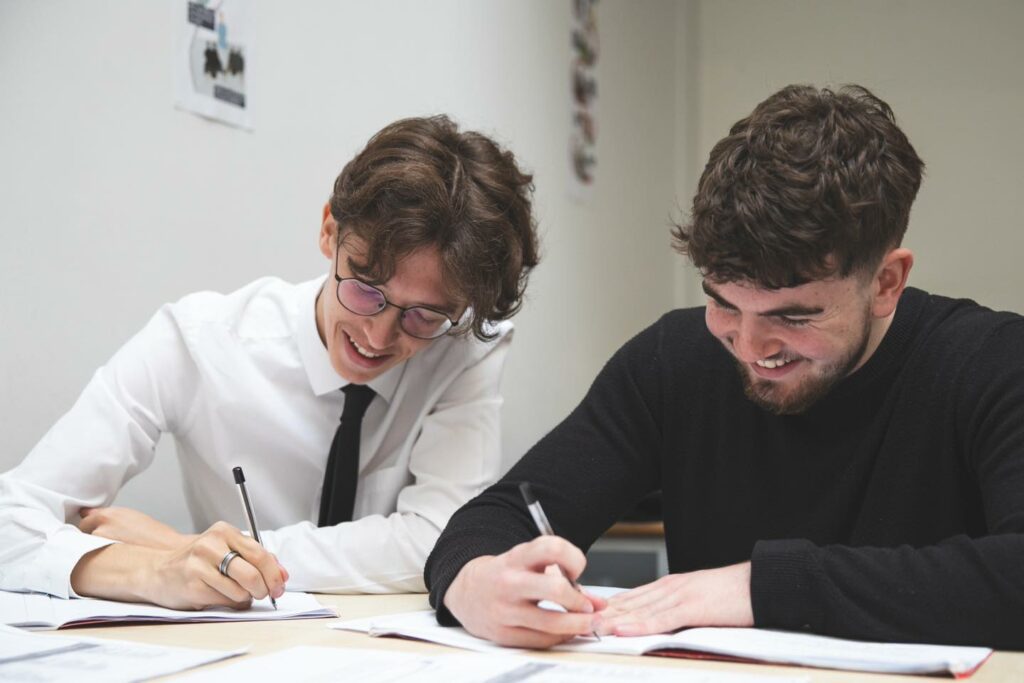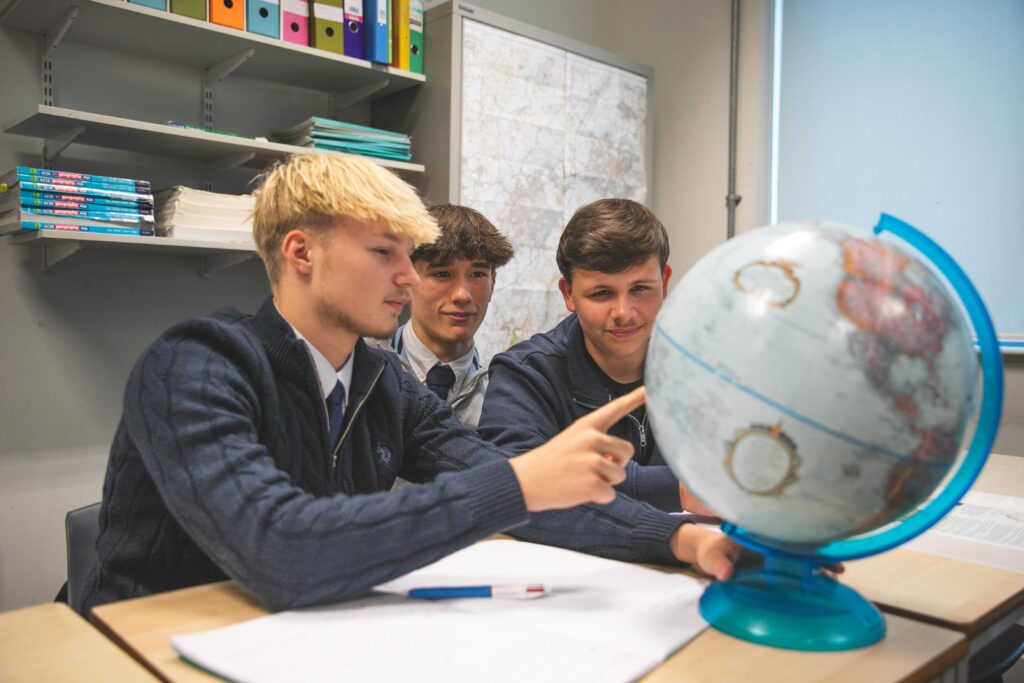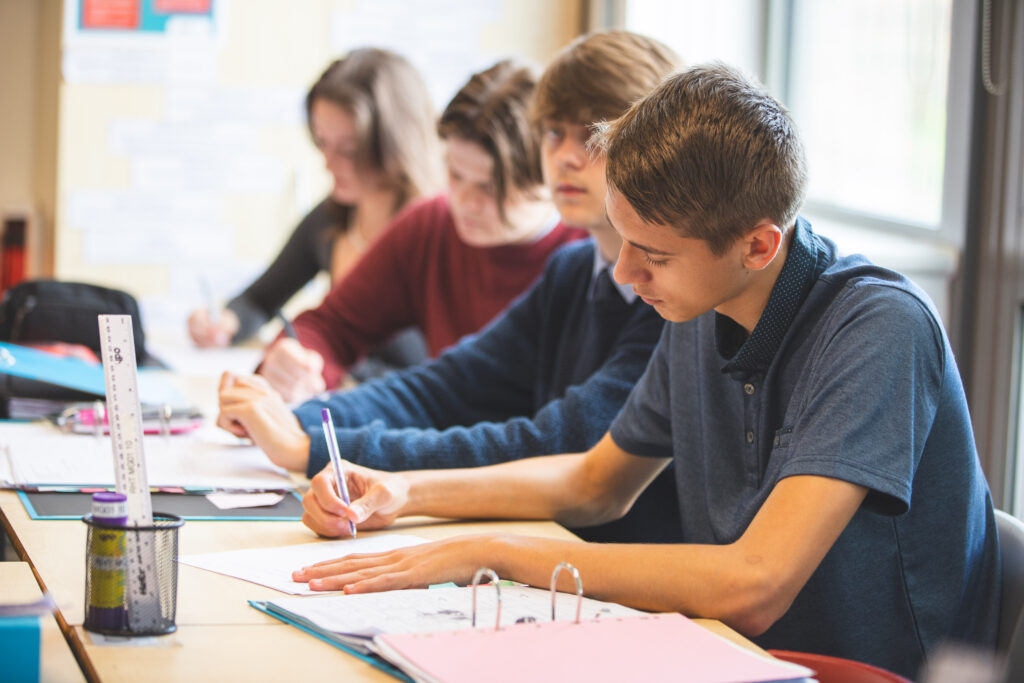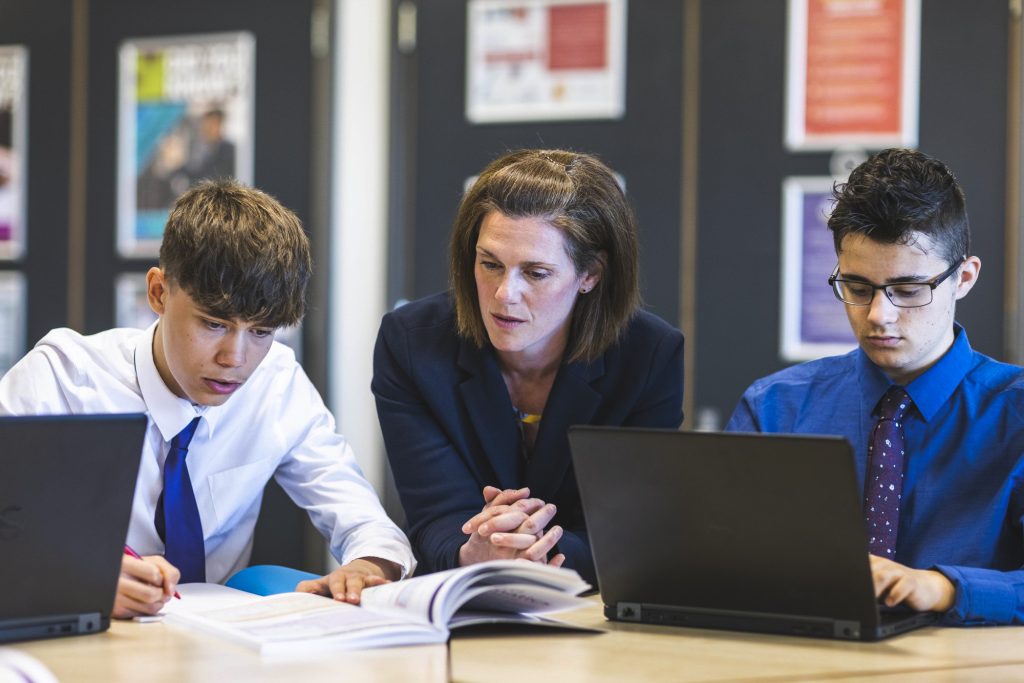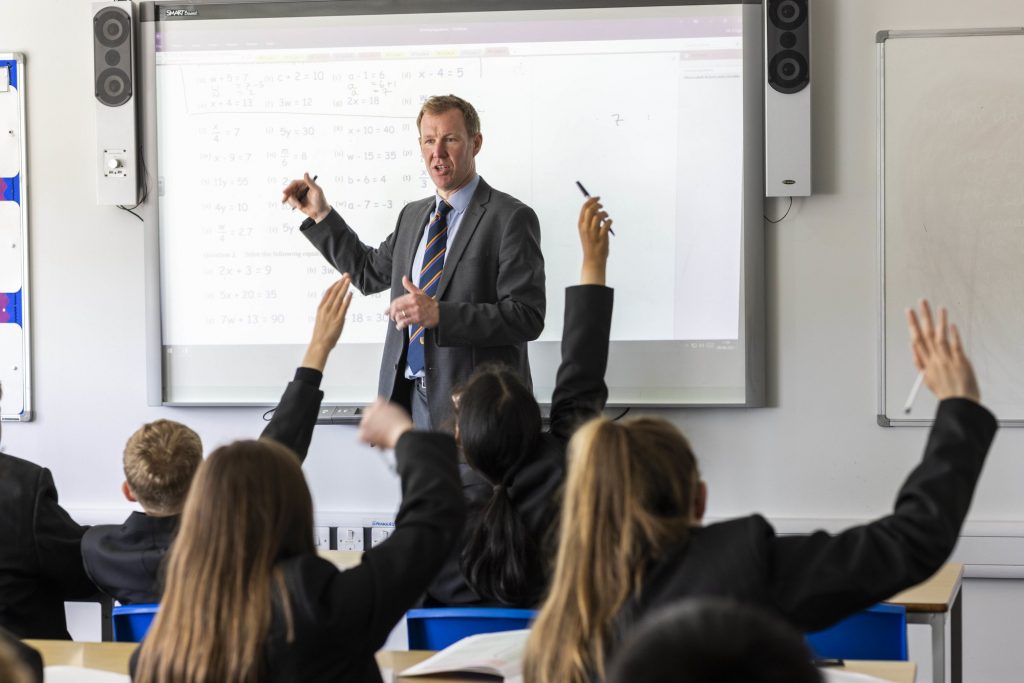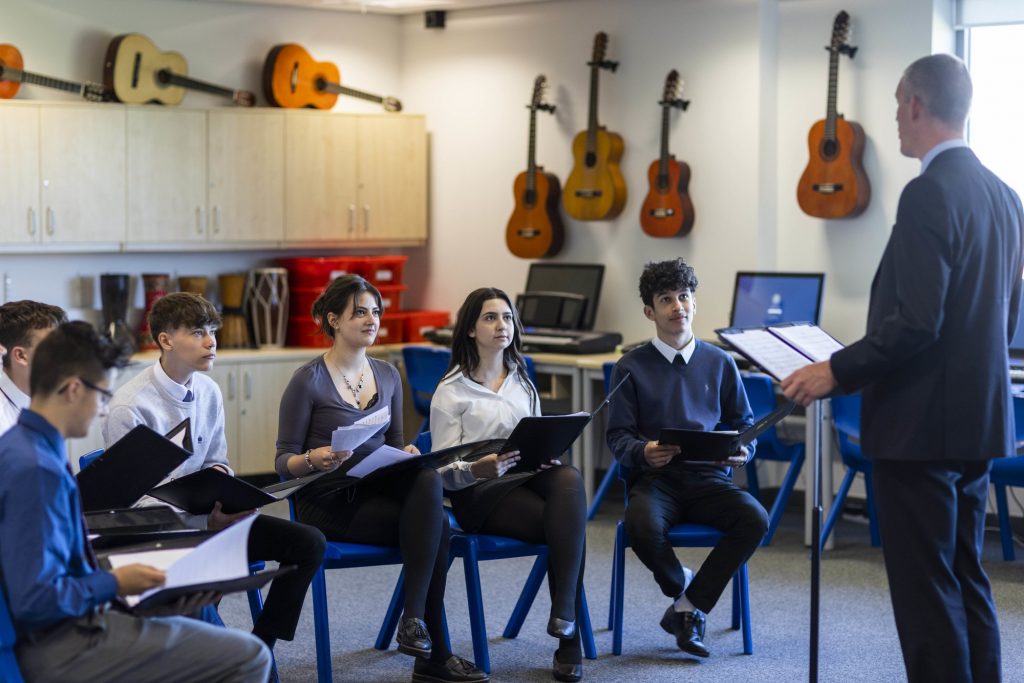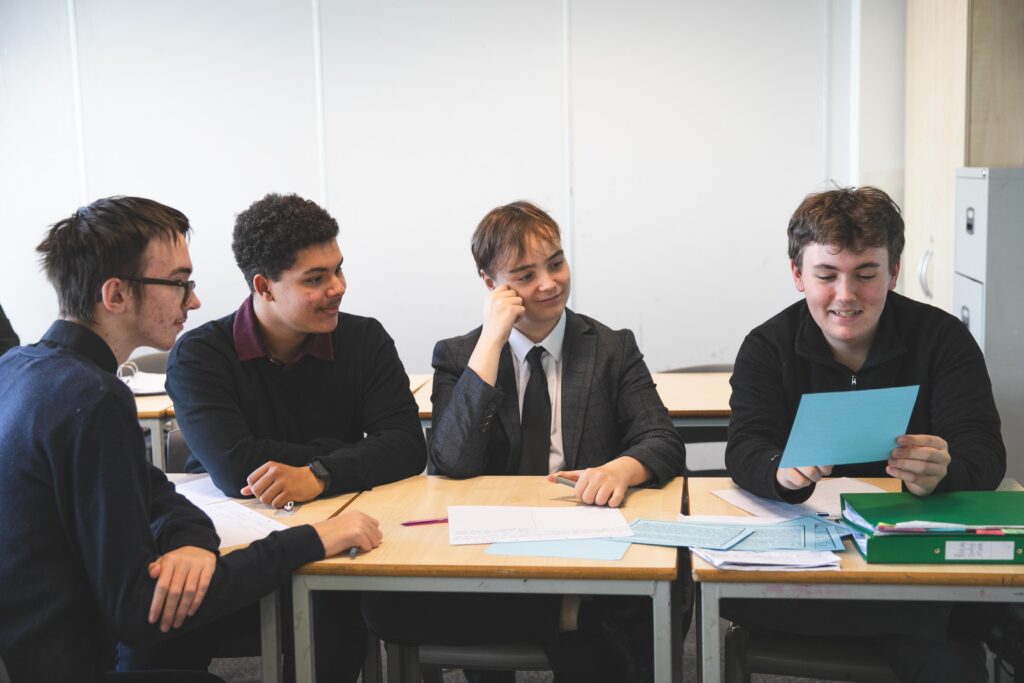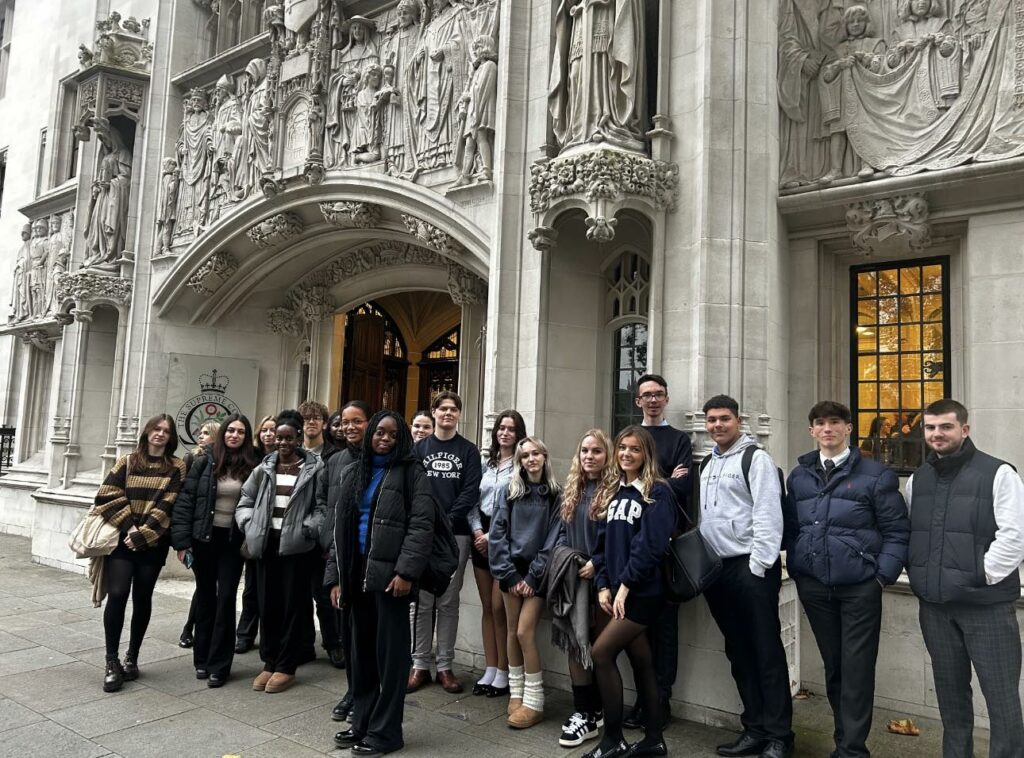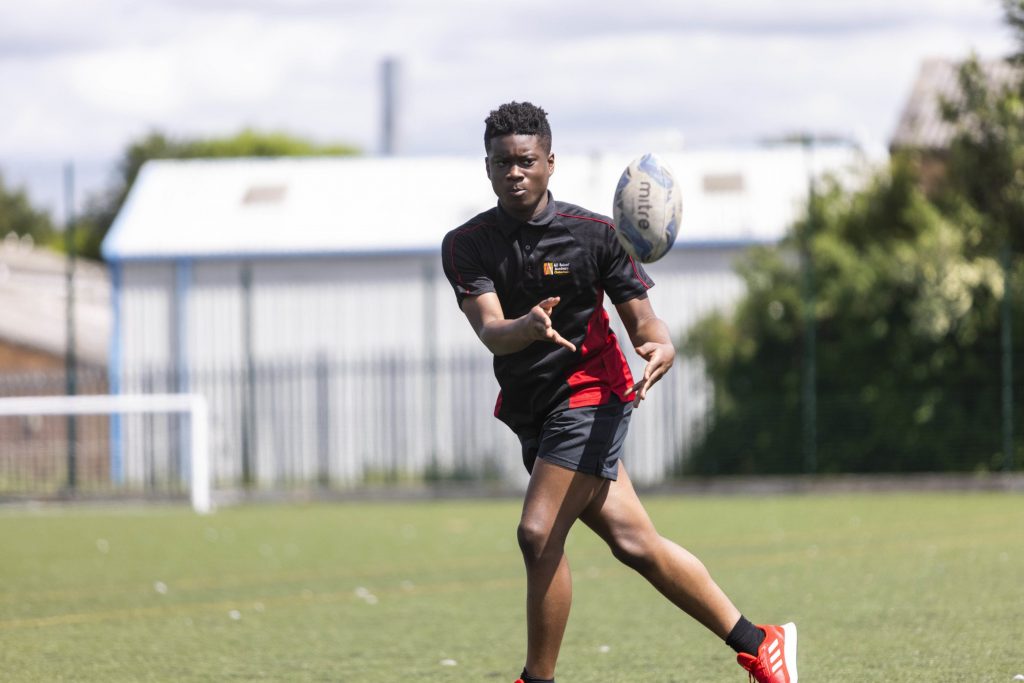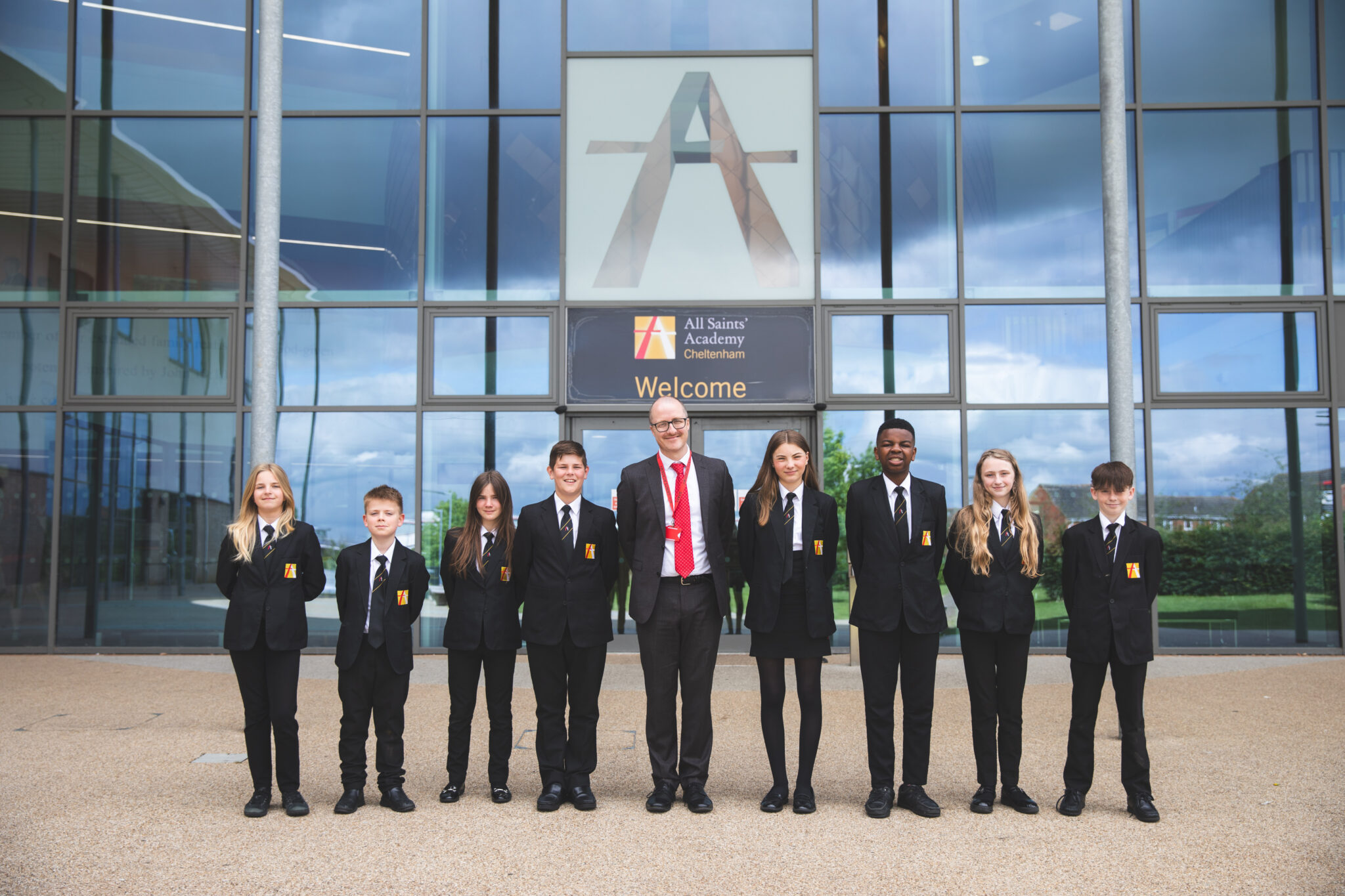Subjects

Art
The Art and Design Curriculum has been designed to engage, inspire and challenge students, whilst equipping them with the knowledge and skills to experiment, invent and create their works of art, craft and design. As students progress through each Key Stage, they should be able to think critically and develop a more rigorous understanding of art and design. They should also know how art and design both reflect and shape our history and contribute to the culture, creativity and wealth of our nation.
In line with the National Curriculum, the Art Department aims to ensure that all students:
- Produce creative work, exploring their ideas and recording their experiences.
- Become proficient in drawing, painting, sculpture and other art, craft and design techniques.
- Evaluate and analyse creative works using the language of art, craft and design.
- Know about great artists, craft makers and designers, and understand the historical and cultural development of their art forms.
Key stage 5 students can complete an A level in Fine Art and/or Photography. During this time, they become fully-rounded Artists. Students follow their creative pathway, producing a Personal Study portfolio of work that can lead them into an Art career or onto a degree course.
The Art Department provides dynamic Knowledge Organisers to both inform and inspire students during each cycle. Rigorous assessment gives detailed and high-quality feedback to students, allowing them to continuously progress in every aspect of their work.
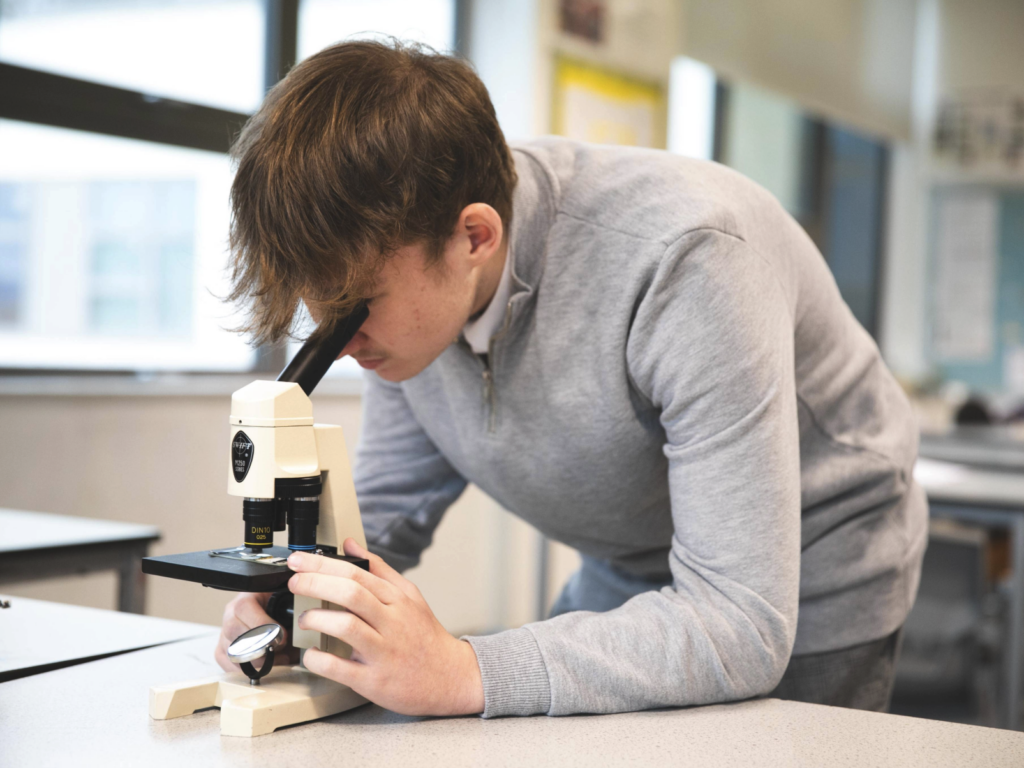
Biology
The Biology curriculum is designed to inspire students to develop a deep understanding of the natural world, from the smallest molecular structures to entire ecosystems. It equips students with essential knowledge and practical skills to investigate the complexities of living organisms and address real-world biological challenges. As students progress through the course, they become confident in applying their knowledge to current scientific issues, such as genetic advancements, medical research, and environmental conservation.
In line with the A Level syllabus, the Biology Department aims to ensure that all students:
- Understand key biological principles, including cellular biology, genetic information, and ecological relationships.
- Develop practical skills by completing hands-on investigations, allowing them to plan, conduct, and evaluate scientific experiments.
- Apply biological concepts to contemporary issues in science, medicine, and environmental sustainability.
- Interpret and communicate scientific data accurately, using appropriate biological terminology.
Key Stage 5 students can complete an A Level in Biology, covering eight core topics:
- Biological Molecules
- Cells
- The Exchange of Substances from Organisms to Their Environment
- Genetic Information, Variation and Relationships Between Organisms
- Energy Transfers in and Between Organisms
- Changes to Organisms in Their Internal and External Environments
- Genetics, Populations, Evolution and Ecosystems
- The Control of Gene Expression
During this two-year course, students will be assessed through three written exams at the end of Year 13, each lasting two hours and carrying equal weight. Students will also complete a Practical Endorsement, which assesses their practical skills separately from their A Level grade. This endorsement is an essential requirement for most STEM-related university courses.
The Biology Department ensures students have access to comprehensive resources to support their learning, including Knowledge Organisers and practical guides. Regular assessments provide detailed feedback to help students achieve their academic goals.
Biology opens doors to a wide variety of exciting career paths, such as:
- Biochemist
- Forensic Scientist
- Medical Professional
- Ecologist
- Sport and Fitness Specialist
Biology is a perfect choice for students who are passionate about understanding how life works and who wish to pursue further study or a career in science.

Business
The Business Studies curriculum allows students to realise their God-given potential. Students are provided with an inclusive curriculum programme through vocational and academic pathways. Both options provide an engaging curriculum by developing an understanding of the business world and the importance of future employment opportunities.
There are many opportunities within business to develop students’ cultural capital with investigations into local, national and multi-national organisations where students can see how they can achieve their potential and what is required to achieve their goals. This sits alongside partnerships with local businesses to provide opportunities through workshops, trips and talks to develop a deep understanding of the curriculum within the real-world context; this allows students to be prepared for future employment in all sectors of industry.
The business courses have been carefully designed to fulfil our vision. The planning of the courses highlights the core Christian values throughout the topics taught, the case studies used and the discussions within lessons. Students consider ethical and moral decisions made by organisations as well considering the ethical and legal requirements of the way employees are treated by the organisations.
Key Stage 5 offers students the opportunity to develop a holistic approach to business by investigating strategic and tactical decisions and how they impact the different business functional areas. The courses, OCR Level 3 Business and Equas A Level Business Studies builds on understanding from Key Stage 4 by allowing students to provide insightful analysis and evaluative conclusions on business concepts.
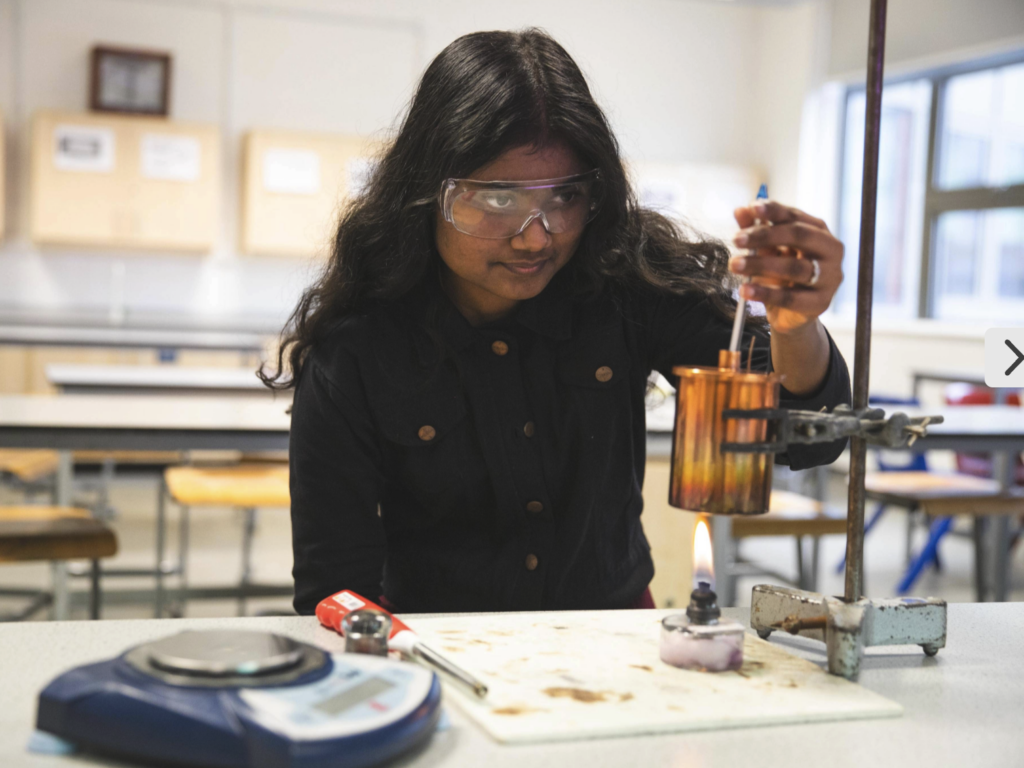
Chemistry
The Chemistry curriculum is designed to engage, inspire, and challenge students, equipping them with the knowledge and skills to understand the fundamental building blocks of matter and how they interact. Chemistry helps students to develop a deeper understanding of the physical world, from atomic structure to complex organic molecules and prepares them to apply their knowledge to real-world issues such as sustainability, medicine, and technology.
In line with the A Level syllabus, the Chemistry Department aims to ensure that all students:
- Develop a comprehensive understanding of key chemical principles, including atomic structure, bonding, and energetics.
- Become proficient in practical skills by conducting hands-on experiments that allow them to plan, execute, and evaluate scientific investigations.
- Apply their knowledge to solve problems in various contexts, including environmental challenges, healthcare, and industrial processes.
- Interpret and communicate scientific data effectively, using the language of chemistry.
Key Stage 5 students can complete an A Level in Chemistry, which covers a broad range of topics across three core areas:
- Physical Chemistry – Atomic structure, bonding, energetics, kinetics, equilibria, thermodynamics, rate equations, and acids and bases.
- Inorganic Chemistry – Periodicity, Group 2 elements, Group 7 halogens, period 3 elements and their oxides, transition metals, and reactions of ions.
- Organic Chemistry – Alkanes, haloalkanes, alkenes, alcohols, organic analysis, organic synthesis, polymers, amino acids, proteins, and DNA.
The A Level course is assessed through three written exams at the end of Year 13, each lasting two hours and carrying equal weight. There is no coursework element in the final assessment.
Students also complete a Practical Endorsement throughout the course, which assesses their practical skills separately from their final A Level grade. This endorsement is essential for students applying to STEM-based university courses.
The Chemistry Department provides a range of dynamic resources, including Knowledge Organisers and practical guides, to support students’ learning and progress. Rigorous assessment gives detailed feedback to students, allowing them to continuously improve in every aspect of their work.
Chemistry opens doors to a wide variety of exciting careers, including:
- Clinical Scientist
- Biochemist
- Crime Scene Investigator
- Forensic Scientist
- Medicinal Chemist
- Nanotechnologist
- Palaeontologist
- Toxicologist
Studying Chemistry at A Level gives students the foundation to pursue further study in the sciences and prepares them to make meaningful contributions in scientific and technological fields.
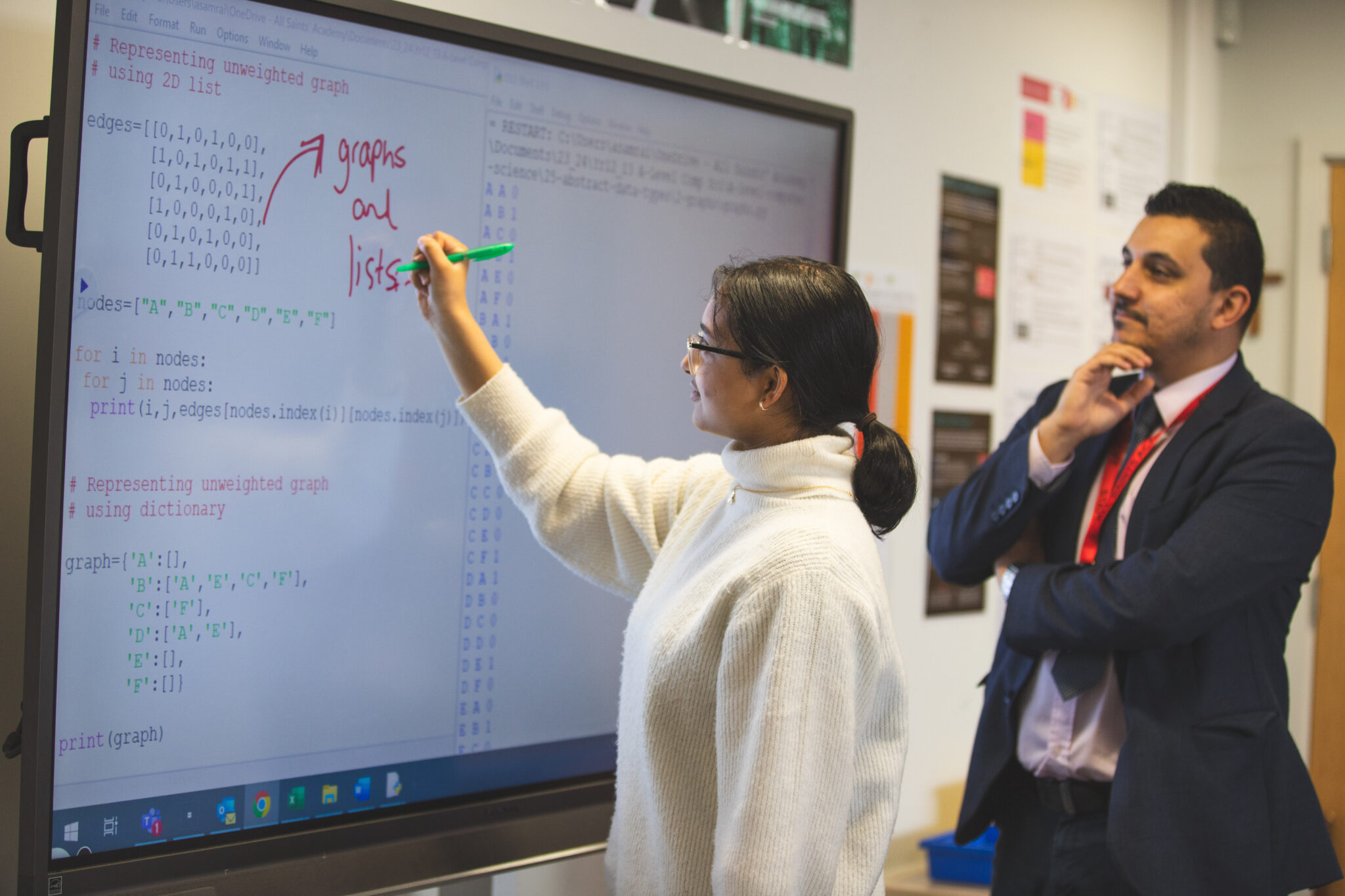
Computing
In designing our Computing curriculum, we aim to achieve the following. Students will:
- Appreciate the prevalence, power and potential of computer technologies.
- Develop competence in the use of industry-standard software and as such be prepared for the 21st century workplace.
- Learn to use technology safely, respectfully, responsibly and securely, including protecting their online identity and privacy and learning to recognise inappropriate content.
- Understand computational thinking and its application to the design of robust computer code and programming techniques.
Through our varied teaching approach and use of relevant and current resources, we will encourage our own developed model of 5 key thinking skills for success in Computing. As well as being taught to read, write and talk about Computing with confidence and fluency, our students will learn to think: critically; concurrently; creatively; collaboratively; and computationally. We believe that these skills will inspire confidence in our students to take on the many types of challenges that formal assessment questions pose and, therefore, improve the chance for their examination success.
Our curriculum aims to prepare our students for their future as digital natives, ready for a global jobs market in which computing technologies will play a fundamental part in the local economy and will support the growth of the ‘Golden Valley’ development and the established GCHQ government agency, becoming the heart of the UK’s Cyber Industry.
At Key Stage 5, we offer A Level Computer Science as a full 2-year A’ Level course as well as a BTEC course which differentiates the ability of students who prefer a vocational route beyond the Key Stage 4. We deliver all our courses (KS3, GCSE, A Level and BTEC) with a variety of recognised pedagogical techniques including, but not limited to: Rosenshine’s Principles; blended learning; and ‘flipped’ learning.
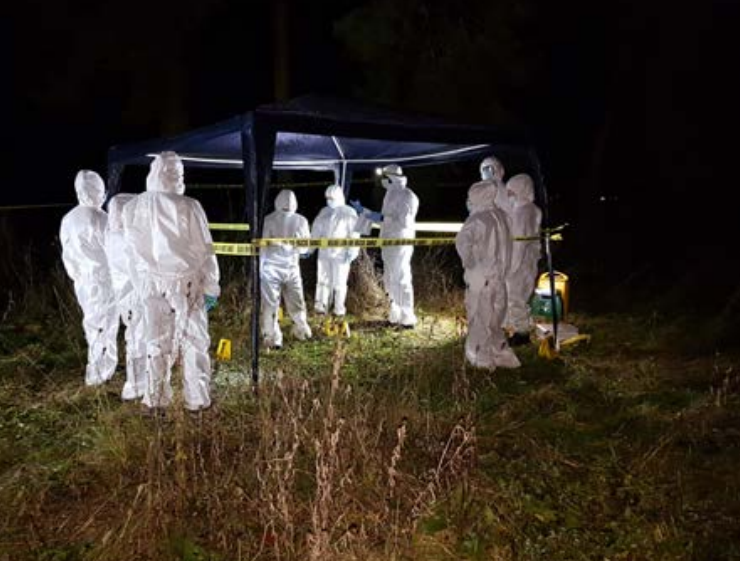
Criminology
The Level 3 Applied Diploma in Criminology is a vocational qualification that has elements of Psychology, Law, and Sociology. This course offers students an ambitious and inclusive curriculum that aims to develop a comprehensive knowledge of the criminal justice system, its roles, and administrative processes. Students will explore the causes and consequences of criminal behaviour, societal unrest, public order enforcement and control, criminal justice system protocols, and the correlation between actions and penalties. The curriculum also investigates the influence of media on public opinion and campaigns to build awareness of unreported crimes and to advocate for law reform.
This course enhances critical thinking, analytical, and communication skills. It empowers students to evaluate the effects of crime on individuals and communities, design advocacy campaigns for change, and present debate arguments connecting crime causation theories to the debate on whether criminals are born or made.

Drama & Theatre Studies
Our vision for the Drama Curriculum is to engage students in worldwide issues in an inspiring and impactful way to provoke thought while gaining confidence and soft skills such as communication and cooperation which they can utilise effectively throughout their time with us in the academy and beyond in the workplace.
The A Level specification in Drama and Theatre Studies is designed to develop and apply an informed, analytical framework for making, performing, interpreting and understanding drama and theatre. Students will develop an understanding and appreciation of how the social, cultural and historical contexts of performance texts have influenced the development of drama and theatre, with a focus on theatre practices used in 21st-century theatre making. Students will experience the following:
- A range of opportunities to create theatre, both published text-based and devised work
- Participate as a theatre maker and as an audience member in live theatre
- Develop and demonstrate a range of theatre-making skills
- Develop the creativity and independence to become effective theatre-makers
- Analyse and evaluate their work and the work of others
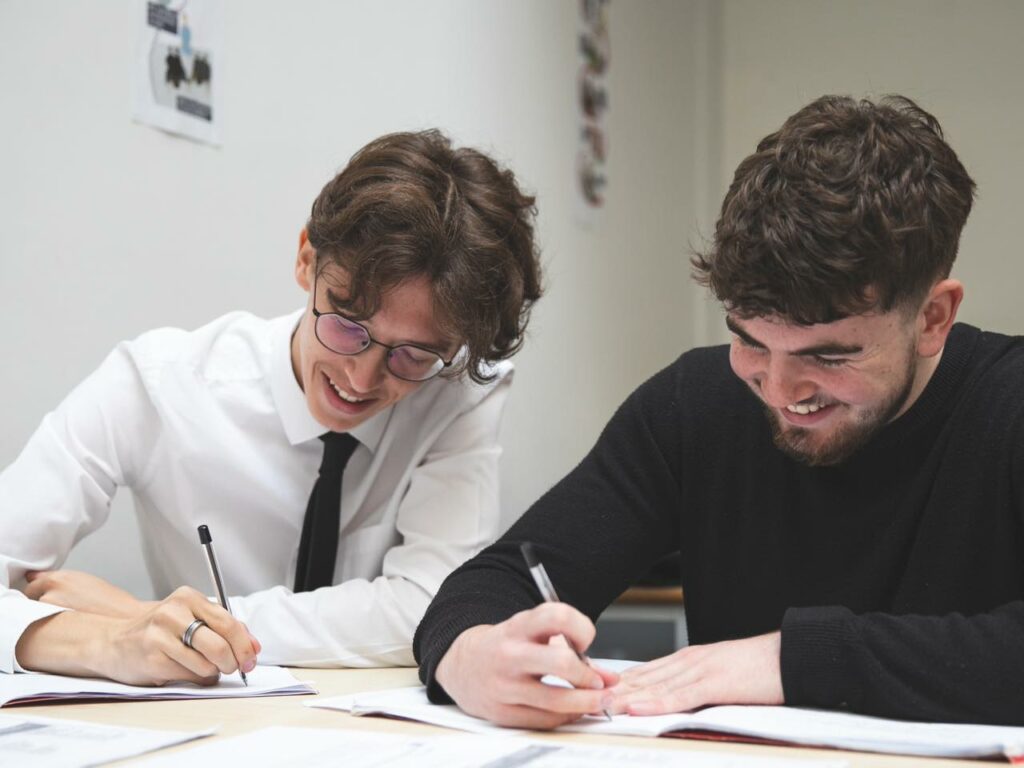
English
At KS5 we offer a choice of two A Levels as well as facilitating English GCSE retakes for those who need to do them.
English Language
English Language A Level gives individuals the opportunity to understand how their language is formed and has changed over time. Having a greater understanding of what makes up and influences one’s language gives students a greater understanding of themselves as an individual and as part of various communities. English Language at A Level will develop transactional writing and analysis of non-fiction texts introduced at GCSE and give students the chance to explore the skills of language acquisition. English A Level also gives students the prospect of exploring the rich culture of the English Language by understanding the varying accents and dialects within our society and celebrating the differences within them. The Non-Exam Assessment element is research-based and gives students the autonomy to investigate an aspect of interest to them in detail
Course Outline
Component One: Language, the Individual and Society. Section A is an analysis of Textual Variations and Representations and Section B is Children’s Language Development.
Component Two: Language Diversity and Change. Section A is Diversity and Change and Section B is Language Discourses.
Component Three: 3,500-word response in total over 2 tasks: a language investigation and a piece of original writing and commentary.
English Literature
They say that English Literature examines three things: who we are, what we are and why we are. This trinity is known as The Human Condition. English Literature explores The Human Condition in some of the most amazing and beautiful language that has ever been written; it introduces you to some of the most incredible characters that have ever been imagined; sometimes it tells you the saddest and funniest stories within the pages of one book. By studying English Literature, you will not only inherit the wisdom of the ages in your journey to adulthood but also foster deep powers of reflection and analysis in your thinking and your writing. The course will endow you with qualifications far beyond an exam grade that can go on your CV. You may want to know what passion, heroism and villainy can drive people to, or why our lives can take extraordinary twists and turns. Look no further than Literature. The holy grail for some literature students is to become writers, but English can lead to specific careers in journalism, law, publishing, editing, and teaching, as well as equipping you for almost any future profession.
Course Outline
Component One: Drama and Poetry pre-1900 Shakespeare: Hamlet Poetry from Christina Rossetti, A 19th Century play: An Ideal Husband, Oscar Wilde.
Component Two: Gothic Fiction: Dracula, Bram Stoker and The Bloody Chamber, Angela Carter and Unseen Gothic Extracts.
Component Three: Non-exam assessment Close reading piece and Comparative essay.

Film Studies & Creative Media
Our curriculum has been designed to ensure that all students can achieve the following across Key Stages 4 and 5:
- Develop critical analytical skills using specialized terminology;
- excel academically;
- channel their enthusiasm for the subject into a greater appreciation for film as an art form in its widest sense.
In addition to this our school vision, where every member of our extended family realises their God-given potential, inspired by John 10:10. Jesus said ‘I have come so you may have Life in all its fullness’ informs and shapes the curriculum in both Film Studies and Creative Media, choosing texts and tasks wherever possible which allow all learners to achieve their true potential.
Film Studies A Level
By choosing Film Studies at A Level all students can develop knowledge and understanding of a diverse range of films, including documentaries, films from the silent era, experimental films and short films. In addition, students learn about film and its key contexts including social, cultural, political, historical and technological contexts. Students will learn a variety of critical approaches which enable them to understand how films generate meanings and responses for audiences.
BTEC Creative Digital Media Production (Level 3)
Students develop an understanding of the media industry through analysing media representations and pitching and producing media projects. They investigate the media industry, looking at the influences of technology and audiences and how media is affected by these factors. Students also develop research skills through their investigations which then inform their media production. Learners study how to analyse and deconstruct media representations and develop the communication and planning skills that allow ideas to be produced.
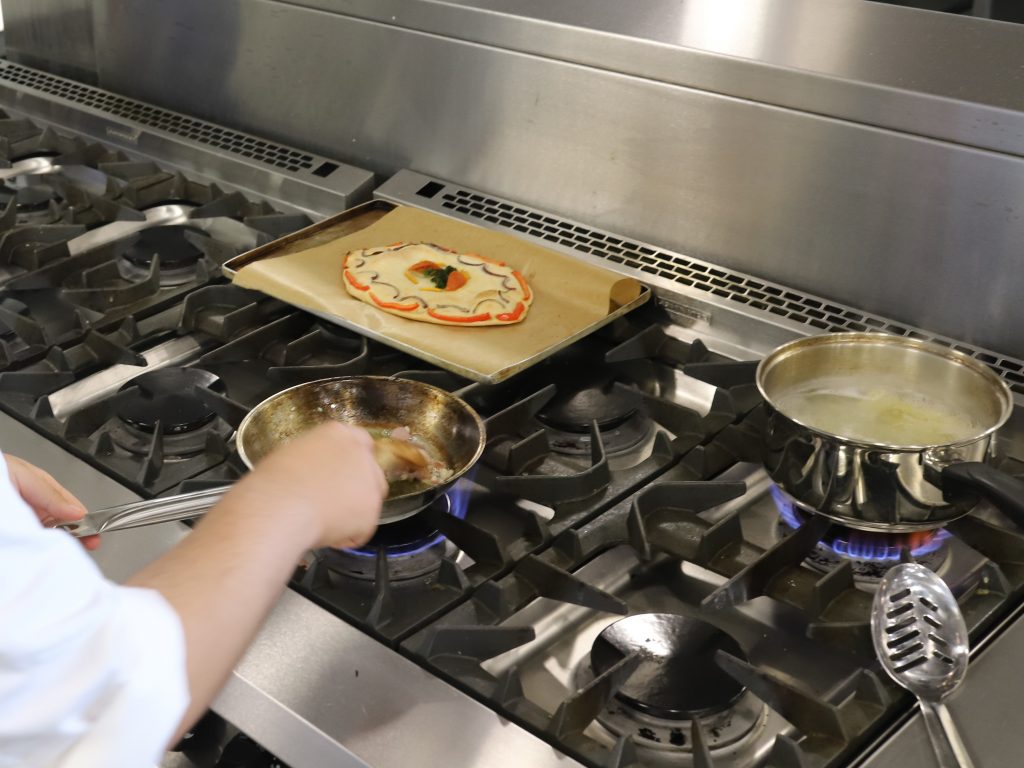
Food Science and Nutrition
The curriculum at all key stages has been designed to be inclusive and develop students’ life skills as well as excel in examination courses. The curriculum is reviewed regularly to ensure it remains current and relevant; keeping up with changes and trends within the industry. The academy’s core Christian values of Love, Peace, Respect, Reconciliation, Service and Justice are embedded through the curriculum.
Students are taught to respect others’ beliefs whether they be religious, ethical or otherwise. Environmental issues related to food production are explored across all key stages, encouraging students to respect the environment and recognise the impact of their food choices.
Examination groups are taught a wide range of increasingly complex dishes, there is also a strong focus on the skills required for a range of jobs within the industry. Students learn about jobs in both areas of the sector including managerial roles such as hotel managers and executive chefs, the range of different chef stations, roles of wait staff and housekeeping, to specialist positions such as Sommeliers. NEA-style tasks all have a vocational focus for example students write proposals for dishes from the position of a sous chef applying for a new position. Examination content is taught through a range of different activities making use of adaptive teaching to support the needs of all students.
At Key Stage 5 students take on a more scientific approach to practical work carrying out practical investigations to solve food problems. At both key stages, students continue to develop their literacy skills through the use of subject-specific terminology, including catering terminology such as ‘au gratin’, ‘Bouillabaisse’ and ‘pâtisseur’. Numeracy continues to be developed through the use of weighing and measuring with an increasing focus on the importance of ratios. Students at Key Stage 4 are required to write timed step-by-step plans to follow when making dishes.
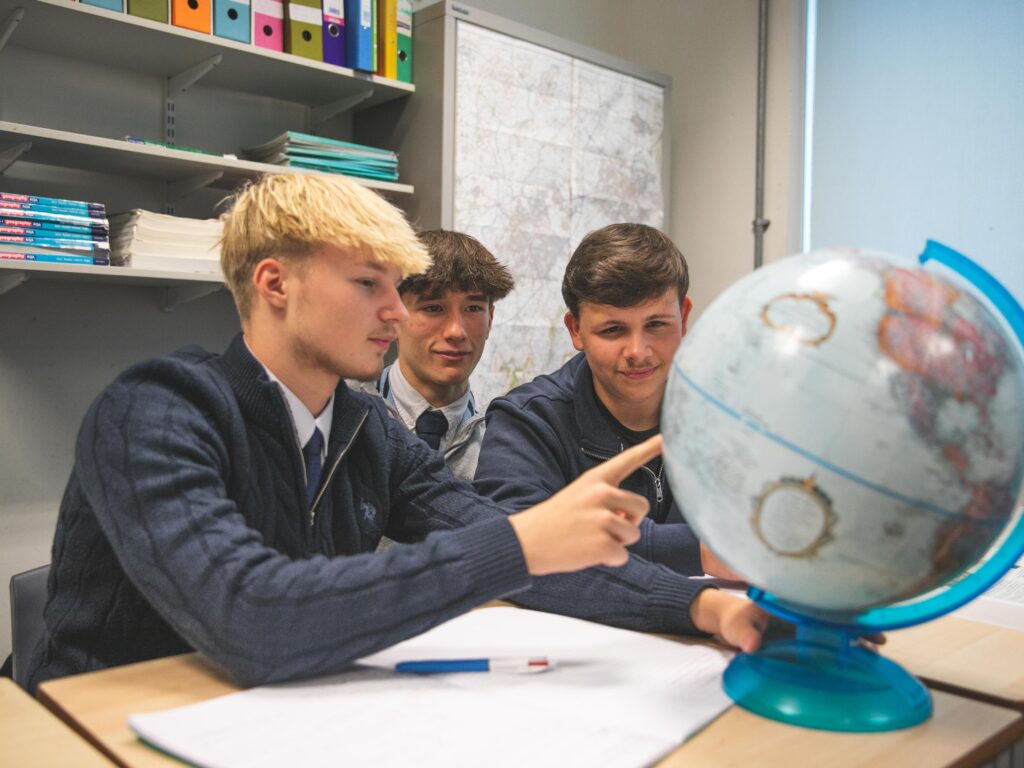
Geography
Our Geography curriculum has been designed to ensure that all students can:
- Explore the world around them, and broaden their view of the world, by understanding and respecting different cultures
- Develop moral responsibility
- Excel academically
The Geography department aims to broaden students’ views of the world while also expanding their knowledge of how the world works and promoting morals and responsibility. We teach a varied and challenging curriculum which allows students at this level to explore different cultures to promote equality. Students study a diverse range of physical and human topics, on both global and local scales. Geographical skills are taught at the start of Year 7, which gives every student foundational knowledge upon which to build through the various key stages. Further skills are embedded and refined during each key stage to allow progression. We promote the wide range of career opportunities Geography can offer within the lessons.
We encourage students to think critically about data, and scientific evidence so that they can make their own decisions on moral and geographical issues. The curriculum focuses on up-to-date case studies, science and topics of great relevance in today’s world. Throughout the teaching of the curriculum, the Academy’s vision and values are apparent.
All staff are incredibly passionate about their subject and want to promote an enjoyment of geography and make each topic accessible to everyone. Lessons, case studies, data and topics are constantly reviewed to ensure that all students are supported and thrive within the subject. Lessons are tailored to the needs of the group so that all students can excel. Formative assessment and teacher assessment allow lessons to be adapted to fit the class and achieve the best outcomes.

Health & Social Care
At All Saints’ Academy, the Health and Social Care department currently delivers Level 1/Level 2 and Level 3 Pearson BTEC qualifications in Health and Social Care. The Pearson BTEC suite of qualifications is designed to offer students the opportunity to experience a broad range of topic areas within the Health and Social Care sector, in a vocational context.
The aim of Health and Social Care is to inspire and motivate students to consider the health and wellbeing of themselves and their local and global community. On completion of a Level 2 Health and Social Care qualification, students feel equipped to explain their understanding of contemporary issues such as factors that influence growth and development and barriers to accessing Health and Care services. At Level 3, students can expand on the issues discussed at Level 2 and critically evaluate theory and research that determines action across the sector. Students feel confident in applying the skills taught and are enthusiastic practitioners looking to pursue a career or University course in the subject. This course looks to maximise the full potential of each student and provides the opportunity for resubmissions to improve work as well as the motivation to achieve the best possible result across each year group.
The Key Stage 5 curriculum in Health and Social Care is also characterised by these key skills and questions throughout the four units covered, but, given the more demanding nature of this Level 3 Extended Certificate, there is an expectation for more key questions to be answered within a cycle. For example, in Year 13 Cycle 1, students are required to answer all of the following questions: ‘What are the roles and responsibilities of people working in HSC? What services do they provide? In what setting?’ This deeper level of understanding is required to ensure that all students are prepared for the next phase of their careers within the Health and Social Care sector – whether this be directly into a job role, further training or University.
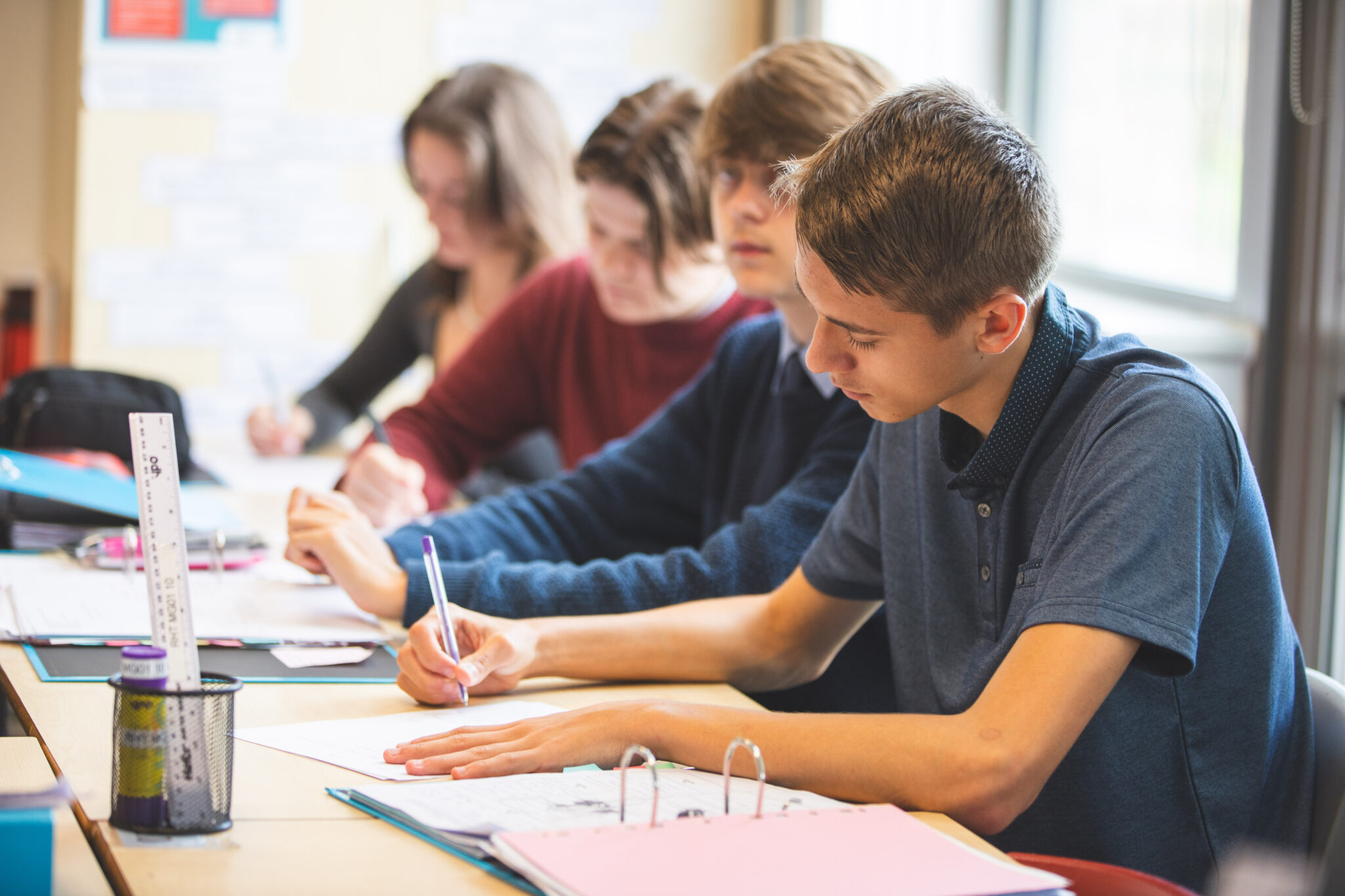
History
Our History curriculum has been designed to ensure that all students can excel academically whilst also supporting their personal, social, moral, and spiritual development so that they can live life in all of its fullness.
The History department aims to empower students with the knowledge and skills to learn about and question the world around them, guided by the knowledge of past events and concepts. Through the study of historical events, students also develop an understanding of historical concepts such as continuity and change, cause and consequence to analyse trends, create accounts and frame historical questions and arguments. The curriculum has been reviewed to ensure it is inclusive and challenging for students, and the contributions and experiences of previously underrepresented groups in History are studied to ensure the diversification of the curriculum. The curriculum also enables students to gain a historical perspective of the connections between local, national and global history and understand short-term and long-term timescales. Throughout the teaching of the curriculum, the Academy’s vision and values are apparent. All staff are incredibly passionate about their subject and put the student at the centre of the learning, with the constant reviewing of practice to ensure that all students are supported and thrive within the subject.
The Key Stage 5 curriculum follows the OCR programme, allowing students to develop their historical skills and understanding further from their Key Stage 3 and Key Stage 4 study. The topics of study are chosen to give students a breadth of knowledge across a wide timescale and global history. The NEA component allows students to deepen their understanding of a topic of personal interest and develops many transferable skills. This curriculum prepares students for their next steps post 16 whether that is university study or employment.

Key Skills
Our Key Skills curriculum has been designed for Year 12 and 13 students to:
- Develop personally, socially, morally, spiritually, and culturally;
- achieve level 2 in the functional skills of literacy and numeracy or GCSE as appropriate;
- excel academically to the best of their ability;
- receive the most aspirational career information, advice, guidance, and experiences to prepare them for the next step on their academic journey to employment.
Inclusivity is at the heart of our curriculum, enabling us to meet the specific learning needs of all our students. This is deliberately planned into all learning stages with a rich knowledge and skills base for all. A flexible and adaptable approach to teaching and supporting each student ensures success.
Our Key Skills curriculum has been personalised in response to the local career and training opportunities in areas such as retail, hospitality, social care and the voluntary sector.
Enrichment of the curriculum in the Key Skills course includes opportunities for work experience within the timetabled week; personal skills development, the ASDAN Certificate of Personal Effectiveness, and the Duke of Edinburgh Award. Students also benefit from running their small business enterprise café.

Mathematics
Our Mathematics curriculum sets out to achieve the following aims. Students will:
- Be confident and competent in key numeracy skills and be able to apply and recognise the value of numeracy skills to their lives and everyday applications.
- Understand that Mathematics is a much richer subject than merely performing a procedure to generate an answer for a test.
- Develop an interest and passion for the pursuit of Mathematics and thus a desire to study a mathematically related subject to A Level and beyond.
Our curriculum is designed to give teachers the resources, training and time to:
- promote specific thinking skills in our students
- secure students’ understanding before attempting further progress
- develop the metacognitive skills of self-reflection and self-assessment
Through teaching approach and use of relevant and current resources, we will encourage our own developed model of 5 key thinking skills for success in Mathematics. As well as being taught to read, write and talk about Mathematics with confidence and fluency, our students will learn to think: critically; concurrently; creatively; collaboratively; and computationally. We believe that these skills will inspire confidence in our students to take on the many types of challenges that formal assessment questions pose and, therefore, improve the chance for examination success.
We understand that students do not make confident progress in Mathematics if they have not secured the foundational prior knowledge necessary for more advanced skills later in the course. Students who carry mathematical miscomprehensions carry a burden which prevents them from enjoying long-term success in Mathematics and our curriculum aims to ensure that no student is left behind.
Our students will learn that Mathematics is more than a subject at the Academy, it’s a language and a tool that they can apply with confidence to their lives, their work and careers in the future.
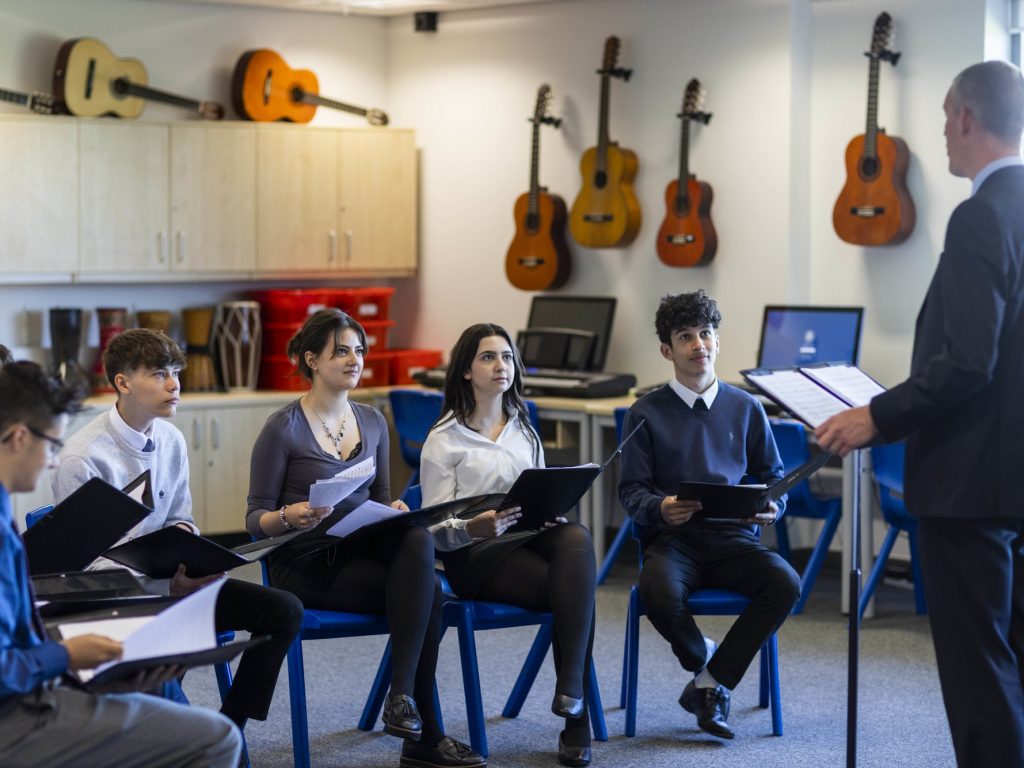
Music
Musical education plays a central role in shaping our sense of personal, social, and cultural identity and, as such, enables students to learn to express themselves and gain the confidence needed to succeed in their education. In addition, learning music develops a wide variety of transferable skills and attributes including independence, confidence, perseverance, and creativity.
Our curriculum enables our students to be able to:
- perform, listen to, review and evaluate music
- learn to sing and use their voice
- create and compose music
- have the opportunity to learn a musical instrument and use a range of technology
- understand how music is created, produced and communicated
The objectives of our curriculum are met through the three core skills of Performing, Composing, and Listening and Appraising Music. All Cycles of Work aim to include these three core skills and include activities which enable students to work on their own, in pairs and small ensembles.
Alongside our classroom teaching, Music forms an important part of Academy life. Students have an enriched curriculum through a vibrant collection of musical ensembles, in conjunction with our Performing Arts Faculty, which we believe offer opportunities to a wide range of students, allowing them to collaborate with other musicians and thus develop their performance skills, understanding and love of the subject.
We endeavour to expose our students to live music including visits to the theatre and concerts. All students involved in music are given regular opportunities to perform in front of others, both as individuals and with various groups.
At Key Stage 5, we offer both Music and Music Technology A Level. Music A Level builds on the skills developed during Key Stage 3 and 4. Students are expected to complete 3 compositions and perform a recital in front of a visiting examiner. For Music Technology, students develop their knowledge of recording, sequencing and acoustics, making use of our recording studio and having the option to visit the University of Gloucester’s sound engineering facilities.

Philosophy & Ethics
When designing the curriculum for all Key Stages, we had our Academy Vision, “I have come so you may have life in all its fullness”, firmly rooted in our minds. The choices we made for all Key stages are linked to the Gloucestershire agreed syllabus, but we were mindful that we had more hours than many schools and we wanted pupils to be able to flourish in their individuality, in addition to learning about how to tackle discrimination in any form.
We have established a safe environment for debate rooted in a Christian ideal of “love thy neighbour” allowing everybody to play their part, safe in the knowledge that they can flourish and develop their own opinions and understanding of world religions in addition to exploring the challenges each of us faces as we learn to reach our potential. Thus, allowing time for courageous advocacy through debate, tackling issues of morality and ethical dilemmas relating from such diverse issues as human sexuality to euthanasia.
In Key Stage 5 pupils use a combination of learning styles, in a similar way to Key Stage 4, and in addition, have the opportunity to be part of our Politics and Philosophy Debating Society. In addition, they have the opportunity to attend lectures that we are invited to via the CEP. A Level of Philosophy and Ethics is relatively new to the Academy, but numbers are steadily growing Year after Year. We use regular assessment under timed conditions to prepare pupils for the rigour of the A Level, and each pupil will write a minimum of two essays per sub-topic with results and targets held centrally so that staff can regularly review progress and set targets to build skills.
Physics
The Physics curriculum is designed to engage, inspire, and challenge students, equipping them with the knowledge and skills to understand the fundamental principles that govern the physical world. Physics allows students to explore the universe from the smallest subatomic particles to the vastness of space, preparing them to apply their knowledge in a variety of real-world contexts and career paths, including engineering, medicine, and data science.
In line with the A Level syllabus, the Physics Department aims to ensure that all students:
- Develop a deep understanding of core physics concepts, including mechanics, electricity, and nuclear physics.
- Become proficient in practical skills by conducting experiments that enable them to test theories and analyse scientific data.
- Apply their knowledge to solve problems using mathematical analysis and logical reasoning.
- Explore how physics concepts are applied in real-world scenarios, from technological advancements to scientific research.
Key Stage 5 students can complete an A Level in Physics, which covers a comprehensive range of core topics:
Core Content:
- Measurements and their Errors
- Particles and Radiation
- Waves
- Mechanics and Materials
- Electricity
- Further Mechanics and Thermal Physics
- Fields and Their Consequences
- Nuclear Physics
Options (one of the following topics is selected in Year 13):
- Astrophysics
- Medical Physics
- Engineering Physics
- Turning Points in Physics
- Electronics
The A Level course is assessed through three written exams at the end of Year 13, each lasting two hours and carrying equal weight. There is no coursework element in the final assessment.
Students also complete a Practical Endorsement throughout the course, which assesses their practical skills separately from their final A Level grade. This endorsement is essential for students applying to STEM-based university courses.
The Physics Department provides dynamic Knowledge Organisers and practical guides to support students’ learning and progress. Rigorous assessment gives detailed feedback to students, ensuring they continuously improve in every aspect of their work.
Physics opens doors to a wide variety of exciting careers, including:
- Engineer
- Robotics and AI Specialist
- Astronomer
- Meteorologist
- Data Scientist
- Biophysicist
- Researcher
Studying Physics at A Level gives students the foundation to pursue further study in the sciences and equips them with problem-solving and analytical skills that are highly valued in various industries.
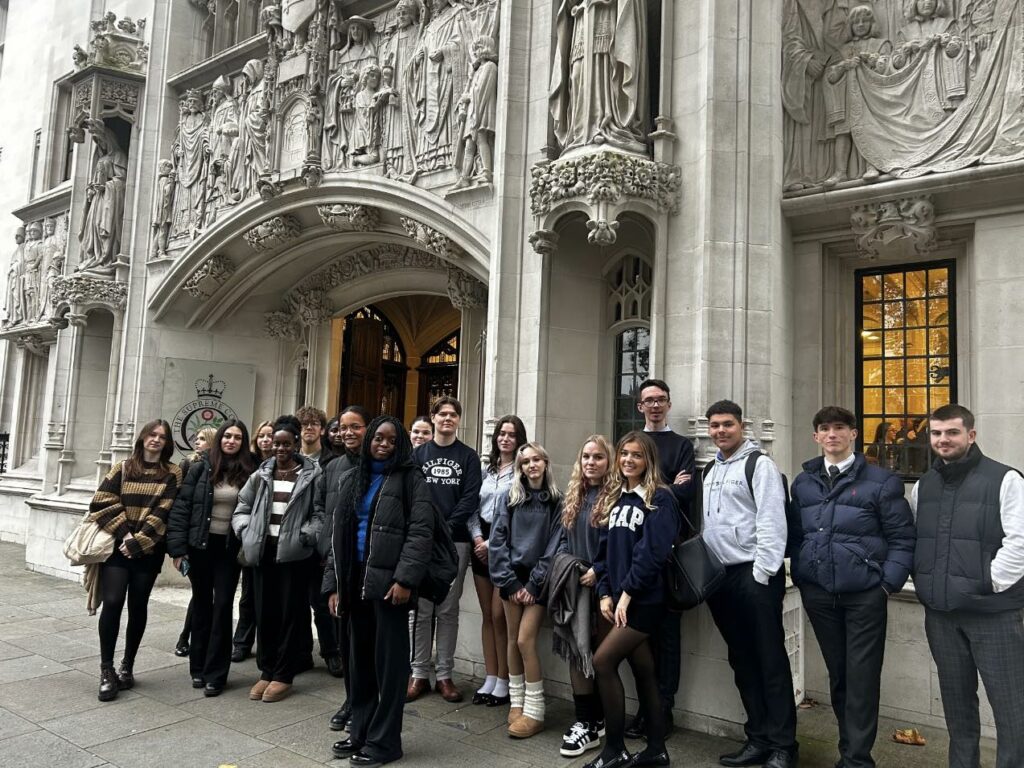
Politics
In a world that is constantly evolving, the study of Politics has never been more relevant or engaging. Our A Level Politics course explores how the decisions that shape our lives are made and examines who holds the power to bring about change. Using contemporary examples, students are encouraged to grapple with challenging questions, developing critical thinking skills and honing their ability to interpret, evaluate, and make well-supported judgments about the nature of politics.
Course Outline
We follow the Edexcel A Level Politics course, which is structured around three key areas:
- Paper 1: UK Politics and Core Political Ideas
Students explore topics including Democracy and Participation, Political Parties, Electoral Systems, and Voting Behaviour, alongside the foundational theories of Liberalism, Conservatism, and Socialism. - Paper 2: UK Government and Non-core Political Ideas
This section focuses on the UK Constitution, Parliament, the Prime Minister, and the interplay between Political Institutions, as well as Feminism as a non-core political idea. - Paper 3: Comparative Politics – Global Politics
Students examine themes such as Globalisation, Global Governance, Human Rights, and Comparative Political Theories.

Psychology
The Psychology Department aims to teach and encourage students to ask questions about the mind and behaviour. Students need to be analytical and critical of the research that they cover in their specifications. The study of Psychology and its concepts allows students to construct arguments and supports them in becoming analytical thinkers who can question human motivation and behaviour. Students should feel confident in applying the skills taught and be enthusiastic practitioners looking to pursue a career or University course in the subject. This course looks to maximise the full potential of each student and provides opportunities for self-reflection and evaluation throughout.
The Key Stage 5 curriculum in Psychology is characterised by key skills and questions throughout the topics covered. Given the more demanding nature of this A Level course, there is an expectation for all key questions to be answered within a cycle. For example, in Year 12 Cycle 3, students are required to answer all of the following questions: ‘Should we conform to fit in? Are we responsible for our behaviour? How can a minority influence a majority to change the world for the better?’ To answer these key questions students must be able to demonstrate knowledge and understanding of psychological theories on conformity and obedience etc., apply psychological theories, approaches and evidence to the key questions and analyse and evaluate psychological theories, approaches and evidence to present arguments, make judgements and conclude, all of which are the key skills for this course. This deeper level of understanding is required to ensure that all students are prepared for the next phase of their careers– whether this be directly into a job role, further training or university.
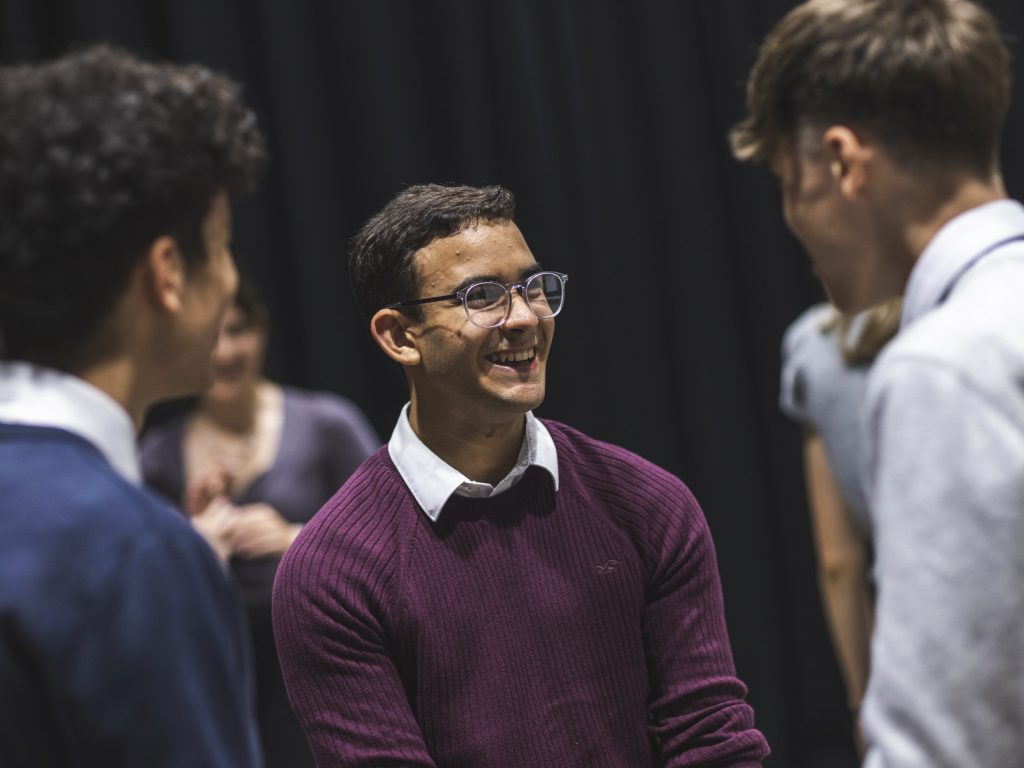
Sociology
The Sociology Department aims to ensure all students reach and fulfil their potential. This means, scaffolding the teaching and learning from top-band concepts, but differentiating the processes of this enough to ensure all students have equal opportunity to learn the organic analogy of society. Students will evaluate each organ (institution) of the organic analogy such as Beliefs in Society, using sociological classical perspectives such as Functionalism and Marxism. Students will further evaluate using modern theories such as Postmodernism and Social Action theory to compare past and present ways of viewing the global world.
Students should feel confident in applying the skills taught and be enthusiastic practitioners looking to pursue a career or University course in the subject. This course looks to maximise the full potential of each student and provides opportunities for self-reflection and evaluation throughout.
The Key Stage 5 curriculum in Sociology is characterised by key skills and questions throughout the topics covered. Given the more demanding nature of this A Level course, there is an expectation for all key questions to be answered within a cycle. For example in Year 13 Cycle 1, students are required to answer all of the following questions: How do we define religious beliefs? How are religious beliefs organised and categorised? What is the function of beliefs according to different sociological perspectives?’ To answer these key questions students must be able to demonstrate knowledge and understanding of sociological theories on beliefs, concepts, and studies etc, apply sociological theories, concepts, and evidence to the key questions and analyse and evaluate sociological theories, concepts, evidence to present arguments, make judgements and conclude, all of which are the key skills for this cycle. This deeper level of understanding is required to ensure that all students are prepared for the next phase of their careers– whether this be directly into a job role, further training or university.
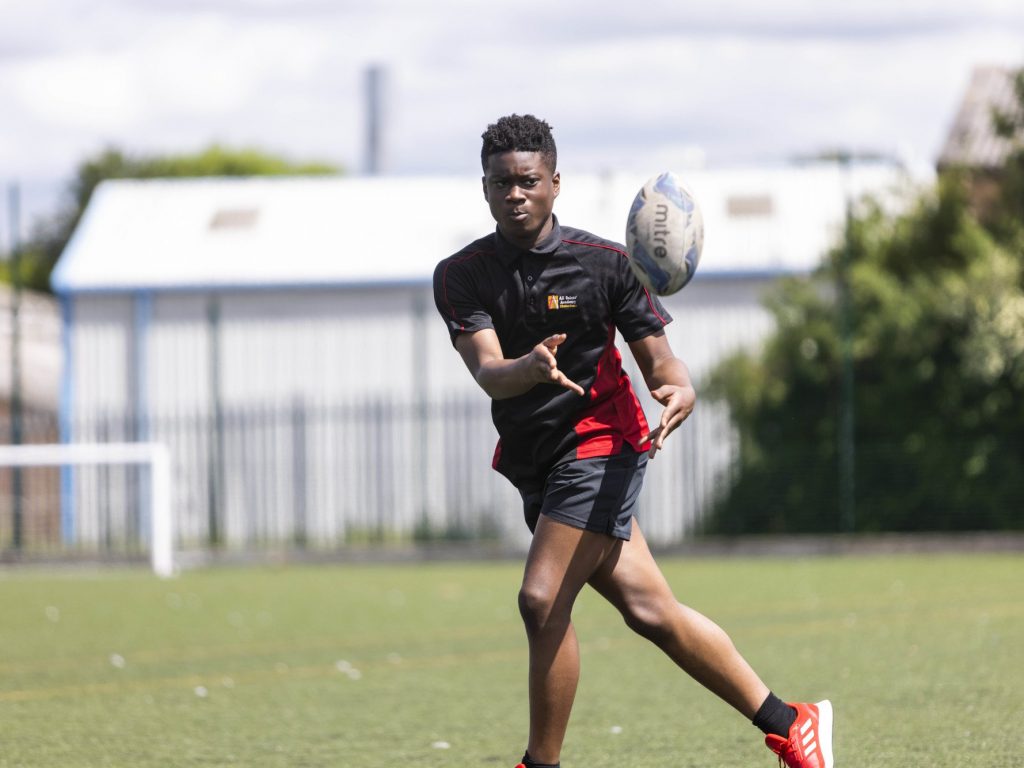
Sport
We have developed our PE vision in line with the Academy vision and the aims of the National curriculum so that we can develop competent athletes to excel in a broad range of physical activities. Our students are physically active for sustained periods and understand the importance of physical activity. We were mindful that our learners also need to engage in competitive sports and activities that lead to healthy and active lives. Additionally, we want to enhance and develop leadership skills through the years to build confidence, resilience, initiative and the ability to motivate others.
Lessons allow us the cover a range of strands to develop the learners, an example of these is: that we develop a range of tactics and strategies through competition e.g. games and individual sports, alongside this we develop technique, physical confidence, leadership skills and the ability to analyse performance.
The course in Key Stage 5 follows the skills developed in both BTEC Level 2 and the GCSE course. We teach the BTEC level 3 sport we offer the foundation diploma (1.5 A levels). The course deepens the learning. There are 2 exams, 1 compulsory coursework unit and 4 optional units. The optional units we pick we feel are the correct ones to extend and develop the learning which enables the learners to develop their skills for employability.

Travel & Tourism
The Travel and Tourism curriculum allows students to realise their God-given potential. The curriculum is designed to engage students by developing their understanding of the Travel and Tourism industry and the importance of future employment opportunities. There are many opportunities within the Travel and Tourism curriculum to develop students’ cultural capital with investigations into a variety of cultures, the significance of a shrinking world as well as understand the importance of looking after the natural world. This sits alongside partnerships with local travel and tourism businesses to provide opportunities through workshops, trips and talks to develop a deeper understanding of the curriculum within the real-world context.
The Travel and Tourism course has been carefully designed to fulfil our vision. The planning of the courses highlights the core Christian values throughout the topics taught, the case studies used and the discussions within lessons. Students consider ethical and moral decisions made by organisations as well considering the ethical implications of dark tourism and the impact of tourism on locals. The Key Stage 5 qualification considers the sustainability and environmental impacts of how all different organisations run and the short, medium and long impacts of looking after the natural environment all around us.
The Key Stage 5 BTEC Extended Certificate in Travel and Tourism offers all students the opportunity to develop a holistic approach to the industry by investigating strategic and tactical decisions and how they affect the industry as well as considering how the industry responds to external factors.
